Recognizing Excellence in Research and Field Education
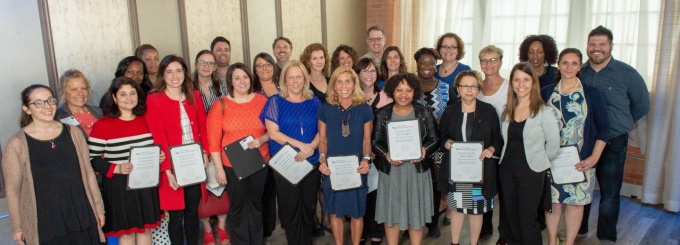
2017-2018 Nominated Field Educators
By Jim Bisco
The School of Social Work's depth of community-based research is navigated toward the heart of myriad social problems via the work of faculty, students and community members themselves. At the same time, introducing the budding social worker into real-world practice via experiential field education can be of paramount influence.
In a ceremony last spring, exceptional work in those two worlds was lauded, as it is annually, in the form of Excellence in Research (EIR) awards and Field Educator of the Year honors, bestowed upon recipients who have made substantial inroads in study and mentorship. Herewith are those who were honored and their stories.
Faculty research focuses on need for cross-systems collaboration for youth
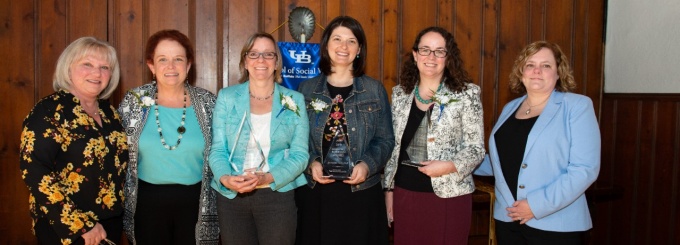
The research impetus has a logical base: systems working together toward a societal betterment. The execution, however, is hazy when it comes to ways through which the homeless services, child welfare and educational systems could collaborate to improve educational outcomes for vulnerable children and youth.
This was the task addressed by Assistant Professors Annahita Ball, Elizabeth Bowen and Annette Semanchin Jones, who collaborated on the cross-system approach to help eliminate the elevated risk of educational problems such as poor grades, bullying, high absenteeism and dropping out experienced by students affected by poverty, homelessness, maltreatment and educational disadvantage.
The study design was informed by a life-course framework, eliciting young adults’ retrospective recall of childhood experiences interacting with multiple systems. The research team took steps to enhance the scientific rigor of the design, data collection process and analyses of the qualitative study.
"This project is exciting to me because while we all know that systems should work together better, not much research has examined how this can be accomplished," said Bowen. "I hope that our project can help to address this gap by highlighting the voices of the young people and the providers who are involved in multiple systems."
Ball explained how homelessness and child welfare services influence the youth she is used to working with in education, "and how the education system is often a siloed system with different norms, values and expectations than many of our other social service systems."
Semanchin Jones summed up the significance of the collaboration that brings individual expertise in child welfare, youth homelessness and education systems to deepen the overall understanding of the experiences of vulnerable youth.
"It seems even clearer that we need more opportunities such as this to work together on finding strategies across systems to improve outcomes for children, youth and families – whether that is through research, practice or policy-making," she noted.
Student study on veterans' PTSD/substance abuse gains insights
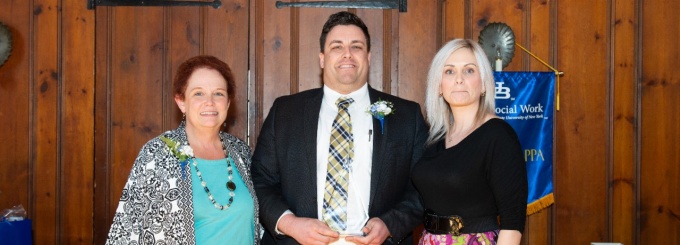
While post-traumatic stress disorder (PTSD) is common among veterans and is associated with significant impairment, it rarely comes alone. Often, substance use problems accompany PTSD. Using survey data from 396 veterans, a study by then-PhD student Brad Linn, PhD ’18, MSW '12, aimed to better understand the relation between veteran mental health and substance use.
"My interest was inspired by former first lady Michelle Obama and Dr. Jill Biden's national endeavor, the Joining Forces program, to get veterans the help that they need and a call for the rest of us to help ease their transition into society," said Linn. "While I was a graduate student at UB, I worked on a project that brought that same set of goals and values to the local level, known as Joining Forces UB."
Linn, 37, is proud of that fact that he himself recruited all 396 veterans in his study. "This was my personal network; my efforts. I leveraged the power of social media," he said. "As doctoral students, when we transition out of graduate school into full-time jobs, we usually don't have data. The nice thing about this project is that it gives me my own data to work with for a couple of years while I'm building other projects." He currently has a postdoctoral fellowship at UB, funded by the National Institutes of Health; he will develop his own research agenda and secure grant funding before transitioning into a tenure track job.
One of the things he hopes his study will add to the social work field is the understanding that veterans can't be treated uniformly. "When they present for treatment, it's up to social workers and other members of the helping profession to really get to know the veteran, understand what their symptoms look like, understand what their childhood was like, understand what the genesis of the symptoms was, and then develop a personalized plan for treatment, rather than a cookie-cutter, one-size-fits-all approach," he said.
Making a difference with facilitated end-of-life family conversations
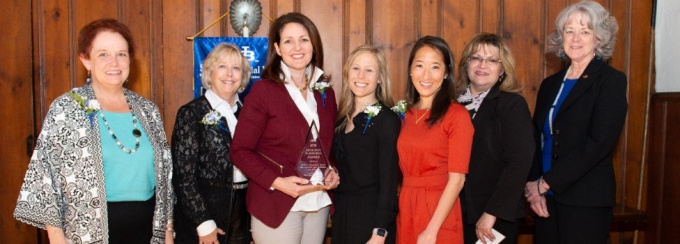
Kathleen Grimm, MD, director of supportive care services and palliative medicine, and Sandra Lauer, RN, director of continuum of care, at Erie County Medical Center are investigating how advance care planning influences well-being in bereaved caregivers. The study is exploring how a facilitated conversation about end-of-life wishes influence caregivers’ perceptions of the final stage of a loved one’s life and well-being in bereavement. The work evolved together with SSW Professor and Associate Dean for Faculty Development Deborah Waldrop's longstanding work in the field.
"We're significantly focused on training, including interdisciplinary, with social workers, chaplains, nurses and doctors on how to use a validated research-proven tool to better communicate. This whole field has been fraught with people saying, ‘I do it,’ 'I got it,' 'I got the directives,' and yet patients and families were not expressing that they felt they had good communication around these advanced care plans," Grimm explained. "Everybody says they're doing 'it' a little differently, creating a lot of forms that are flying around, and patients and families are still left angry and grieving. That's why we started down this path."
"The study started in conversation with Hospice Buffalo," Lauer said. "We were offering education to the social workers on how to facilitate values-based conversations about care preferences using the Serious Illness Communication guide. Dr. Waldrop is doing a longitudinal study with the caregivers to see if it was helpful to them to have these previous conversations; if it relieved them of the grief and the burden of guilt that can come from people making decisions that they may not have talked about in advance. It has gone away from the medical model to a community-based paradigm where the family and the patients themselves control some of that conversation, which is wonderful."
Both noted a long history of working with UBSSW interns at ECMC. "We've had very interesting intersections with the UBSSW," said Lauer. "We had the Social Impact Fellows here last year. They did a great project for us – Integration of Palliative Medicine into Primary Care – and we're integrating that plan now."
Comprehensive field education makes lasting connections
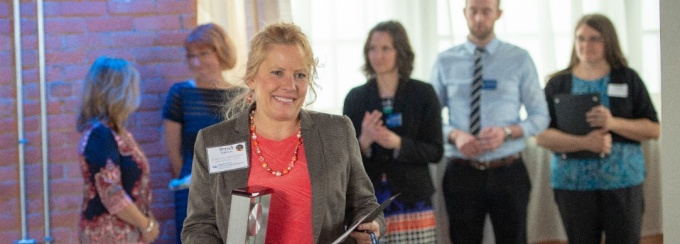
Brandi Biddeman, MSW '01, has been a social work therapist and behavioral health social worker with VA Western New York Healthcare System for 18 years, the last 10 of which she has also served as a field educator for the School of Social Work. Her experience as a student has had a lasting influence she wanted to share.
Providing individual and group therapies, Biddeman's area of specialization is evidenced-based psychotherapies for depression, PTSD and insomnia. "I don't believe in keeping people in therapy forever just to chit-chat. We do very intensive structured therapies, and then discharge them. I see the results every day, all the time," she explained. "This approach allows for improved outcomes for veterans and the ability to increase access to care as veterans see improvements and decreased need for services more quickly."
Biddeman's MSW interns are exposed to all treatment modalities and groups during their internships at VA. "I love being a field educator. In modeling trauma-informed care and ethical social work, I have the ability to shape the future practice in our discipline. It also keeps me fresh, making me a better social worker," she said.
She is known for creative approaches, giving students opportunities to practice the skills they are learning in school. By reviewing their syllabuses and integrating the information into a calendar, she is able to match field experiences with what is actually happening in their classroom.
Being named Field Educator of the Year is meaningful for her. "It's confirming I'm doing a good job," she said. "Most of the interns who have graduated still keep in touch with me, whether it's to say, 'I'm starting a depression group. Do you have any ideas for resources or materials?' Or, sometimes I let them know about new job postings. My first intern has worked at the Syracuse VA for a number of years. That's another affirming thing: that there really is a connection and that I really had an influence on their lives."